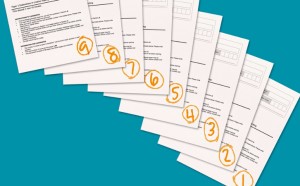The English Section of the 11+ exam tests students through various intricate points of language understanding such as proper vocabulary usage, grammar, punctuation, comprehension of passages, and ability to write creatively. Familiarizing oneself with the English Section can be a great plus as most of the verbal section includes parts related to English too.
Two main testing boards conduct the 11+ exam; Granada Learning (GL) and CEM (Centre for Evaluation and Monitoring). The 11+ exam varies depending on the school your child is applying for. This is because schools can prepare customized tests and their pattern can slightly differ. This is why It is important to research and get access to the practice papers of a school your child is applying to.
How to Prepare English for 11+ Exam?
The English Section of the 11+ exam includes the following subsections :
- Spelling
- Grammar
- Comprehension
- Vocabulary
- Punctuation
- Creative Writing
All of these points holistically target a student approach to understanding English
Focusing on Improving Core Skills
Improving English is a consistent process and cannot be achieved overnight. The English section of the 11+ exam focuses on the learnings done in the previous key stages, especially Key Stage 2 and Key Stage 3. Hence, focusing on the curriculum of these classes will prove essential in the future. Motivate your child to pay special attention to homework and classwork because these are elements that build toward progress in the 11+ exam. Sitting with your child and helping with homework will closely help you analyze the areas that can be improved.
Try to test your child and see if any weaknesses can be turned into strengths. Do not directly solve papers with your child, rather focus on the core areas consistently. Determining the weak areas will also help in areas where a child needs to focus more. Do not scold your child for any mistakes, rather help again and again until the mistakes are improved
Spellings
Spellings are at the forefront of the examiner and can easily be noticed. Help your child practice over misspelled words. There are learning methods that can help in improving spelling. You can verbally practice with your child and help in memorizing common spelling mistakes. Spelling games are one way of making learning more fun.
Punctuation
Punctuation is essential for clarity and meaning in writing. Use exercises that focus on the correct use of punctuation marks like commas, apostrophes, and quotation marks. Editing short paragraphs for punctuation can create consciousness to avoid errors.
Specific Focus on these areas will not only help in the MCQ section but also refine writing abilities.
- Semi-colons
- Hyphens, brackets, dashes
- Capitalization
- Colons
- Commas
- Apostrophes
Sentence Structure
The 11+ exam expects students to show their ability to write well-formed sentences that effectively convey their ideas. This involves understanding parts of a sentence such as the subject, predicate, and other sorts of phrases and sentences. Proper sentence structure also includes the use of many sentence kinds, such as basic, compound, and complicated phrases, to generate interesting and dynamic writing.
Creative Writing
The creative writing section is tested by various schools and this is why a student must stay well-prepared. Creative writing is an opportunity for children to showcase their imagination and writing skills. This section tests their ability to develop a coherent and engaging narrative.
Comprehension
Comprehension tests a child’s ability to understand and interpret written texts. This section assesses both literal and inferential understanding. Ensure your child reads a variety of texts, including fiction and non-fiction. Motivating your child to read a book will enormously contribute to comprehension of texts.
Vocabulary
A rich vocabulary enables children to understand and express complex ideas effectively. Help your child create and review lists of high-frequency words found in 11+ exams. You can also use flashcards to help your child memorize new words and their meanings.
Practicing Exam Papers
Practicing on past papers is a great strategy for preparing and revising concepts for the 11+ exam. These papers provide insight into the exam’s format, question types, and difficulty level, allowing children to familiarize themselves with what to expect on test day.








